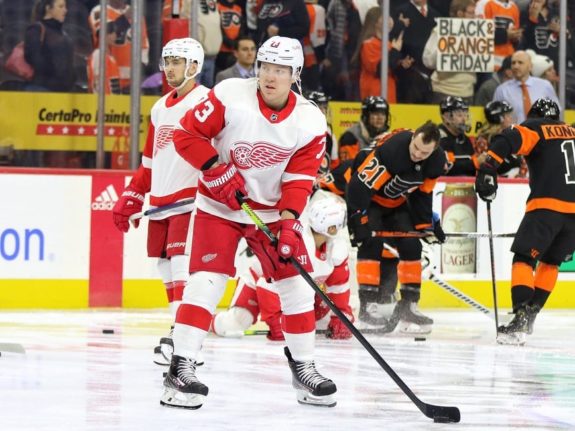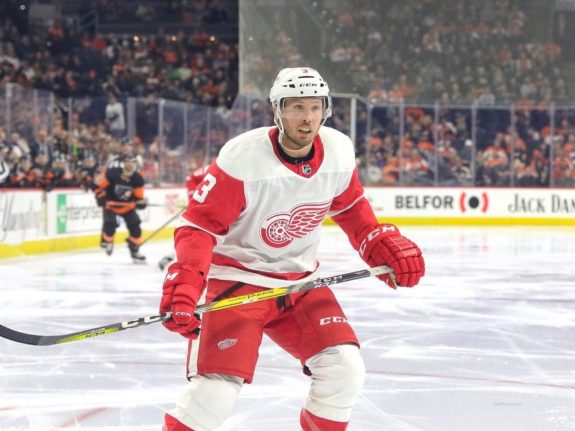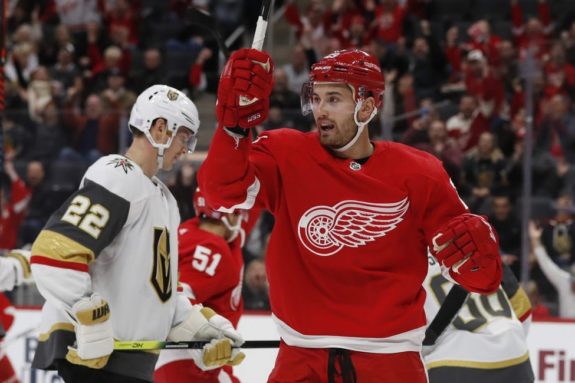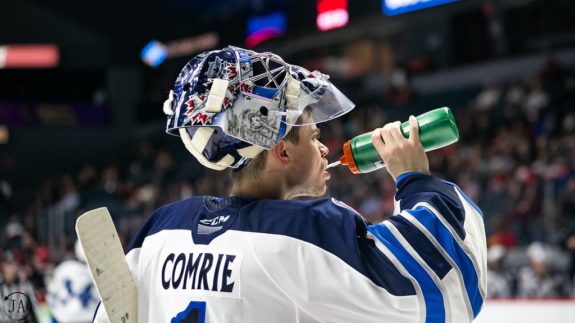General manager Steve Yzerman’s fateful homecoming to the Detroit Red Wings has brought with it the winds of change. Yzerman, not one to idly sit by, has made a variety of trades, signings, and deals to ensure the team doesn’t get too complacent. If he sees a need, he fills it. If he notices a prospect or player under-performing, he ships them out without a second thought. This open, honest approach to general management is a far cry from former general manager Ken Holland’s more conservative approach, a style which often left many fans frustrated.
Since assuming the role of general manager in April, Yzerman has made six trades, shipping out players and picks alike for much-needed roster shake-ups. While some have proven to be wonderful successes, it’s common knowledge that not every trade results in a win. Today, we’ll look at how these trades have panned out so far and how they’ve affected the makeup of the roster.
1. 2020 4th Round Pick for Adam Erne
Before the season began, Yzerman made a trade to his old team, the Tampa Bay Lightning, for Adam Erne. Erne, who scored his first two goals of the season on Dec. 17 against the Columbus Blue Jackets, has yet to pan out as the depth scoring threat Yzerman had hoped. Instead, he’s served as a checking role on the team’s bottom six, playing alongside teammates like Luke Glendening, Justin Abdelkader, and Frans Nielsen — none of whom are offensive threats.

While he hasn’t necessarily played poorly, it was expected that Erne would contribute more on the offensive end and would assist players like Nielsen with more point generation. All in all, the value given up for Erne’s trade remains to be seen. Having said that, the two goals scored against the Blue Jackets may be a sign of things to come. Time will tell whether he’s adjusted to his role or not.
Current Grade: C-
2. David Pope for Alex Biega
Pope, a fourth-round pick in the 2013 NHL Entry Draft by the Red Wings, struggled to remain on the team’s American Hockey League roster with the Grand Rapids Griffins. Meanwhile, Alex Biega, a veteran on the Vancouver Canucks’ roster, struggled to remain on the team’s NHL roster. Roster moves were needed to give both players the fresh starts they deserved. Thus, the Biega-Pope trade was born.

Biega has done an amicable job with the Red Wings, serving in 18 games so far this season. While not standing out by any means, Biega has remained remarkably resilient, doing his best to generate play whenever he sets foot on the ice. Pope, on the other hand, has unfortunately found himself further floundering with his new team, having been demoted to the Kalamazoo Wings of the ECHL. With Pope struggling with consistency and Biega remaining on the NHL roster, it appears the Red Wings have won this trade.
Current Grade: B
3. Alec Regula for Brendan Perlini
The trade of defensive prospect Regula for Chicago Blackhawks forward Perlini appears to be a wait-and-see trade, similar to the Erne deal. Perlini has just two points in 21 games with the Red Wings. He has yet to find his scoring touch, but it’s likely that he will land somewhere among his average of 15-25 points by the end of the season. While those numbers aren’t much to write home about, it’s important to note that he’s spent the majority of his time on the ice with Nielsen and Christoffer Ehn — two players that combine for a whopping three points.

Regula, on the other hand, will be serving on one of the top defensive pairings for Team USA in the World Junior Championships on Dec. 26. Regula sits near the top of the London Knights’ defensive scoring with 26 points in 27 games. While a perfectly capable prospect, he seems to benefit greatly from the team that surrounds him. Time will tell whether he pans out as a capable NHL prospect. As of right now, it looks like Chicago has won the trade.
Current Grade: C-
4. Jacob de la Rose for Robby Fabbri
The current winner for the most lopsided trade in the 2019-20 season is the de la Rose-Fabbri trade. Fabbri, who served as a healthy scratch for several games on the St. Louis Blues’ roster, hit the ground running the moment he set foot on Detroit ice. Fabbri currently sits sixth in team scoring with 15 points in 19 games, generating a majority of his offense on the team’s top-six unit. He’s proven an incredibly capable player game in and out, making his presence known every time he sets foot on the ice.
On the other hand, de la Rose has just three points in 17 games. While de la Rose’s play style doesn’t focus on scoring, the sheer imbalance of the trade makes Yzerman and the Red Wings easy winners. He’s a perfectly capable fourth-liner, but Fabbri’s offensive acumen makes him a far more valuable piece to any roster. Yzerman worked wonders to accelerate the team’s rebuild with this trade; Fabbri will likely remain on the Red Wings’ roster for years to come.
Current Grade: A+
5. Vili Saarijarvi for Eric Comrie
The Griffins were suffering from a defensive logjam. Blending AHL veterans with up-and-coming prospects left very little room for upward movement within the roster. Yzerman, recognizing the need for change (and the need for a goalie in light of Jimmy Howard’s injury), opted to trade 23-year-old Saarijarvi for goaltender Eric Comrie. Saarijarvi, who struggled to make the Griffins’ roster in 2018-19, had just one point in 13 games with the Griffins before his trade.

Comrie played three games for the Red Wings before being waived, sporting an .864 save percentage and a 4.28 goals-against average. Unfortunately, the Winnipeg Jets chose to claim Comrie from the waivers, causing the Red Wings to lose him from their roster without any return. While the waiver claim may seem like a loss for the Red Wings, it’s important to note that the Jets are now obligated to have Comrie on the roster. With a goalie tandem in Connor Hellebuyck and Laurent Brossoit, it’s likely that Comrie or Brossoit will need to be waived, giving the Red Wings another opportunity to claim one of the two.
As it currently stands, the Red Wings have freed up a defensive roster spot for a goalie that was immediately claimed when waived. What becomes of Saarijarvi remains to be seen, but it currently seems like the Red Wings have lost this trade.
Current Grade: D
6. Oliwer Kaski for Kyle Wood
Kaski signed a one-year deal with the Red Wings in the 2018-19 offseason, hoping to score time on NHL ice after earning MVP honors in the SM-Liiga in Finland. With just five points in 19 games with the Griffins, Kaski seems to have trouble adjusting to North American ice. Yzerman, noting this, opted to trade him to the Carolina Hurricanes for Kyle Wood, a 6-foot-7 defensive prospect of similar skill.
Wood has performed well in his role, filling in where Kaski left off with similar play and nearly identical point totals. While he’s projected to be an AHL player, this trade can be considered a “win” by Yzerman, as he managed to flip a free agent signing for a third-round pick that will likely retain his role in the AHL. His presence as a leader on the ice can be a boon to young players like Seider as he learns the ins and outs of North American ice. Time will tell what becomes of Kaski’s NHL career, but he will have an uphill battle against Carolina’s supremely efficient defensive pairings if he hopes to crack the roster.
Final Grade: B+
What trades have worked best for the Red Wings so far? Which have been the biggest failures? Let us know in the comments!